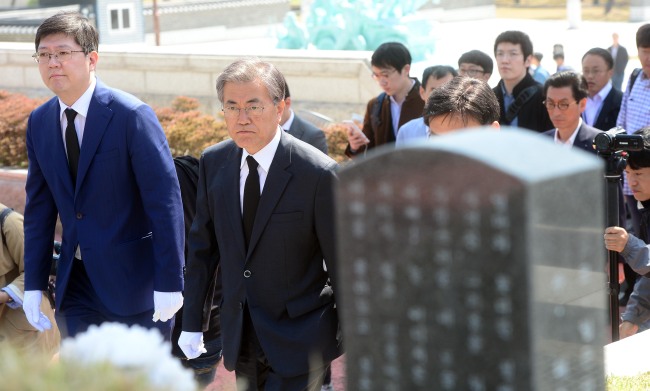[Election 2016] Minjoo struggles to win back Gwangju voters
By Yeo Jun-sukPublished : April 10, 2016 - 16:22
GWANGJU -- Some 20 kilometers from downtown Gwangju, a southwestern city of South Korea, lies the May 18 national cemetery, resting place to nearly 700 souls who lost their lives in the violent crackdown of the pro-democracy demonstration in 1980.
The birthplace of the nation’s modern democracy was thrust back into the spotlight Friday by a surprise visit from Rep. Moon Jae-in, the former leader of the main opposition Minjoo Party of Korea. Moon showed up alongside Kim Hong-gul, the third son of late President Kim Dae-jung.
“I will achieve a history of upholding the Gwangju spirit,” Moon wrote in the guestbook. He then paid his respects to the deceased democratic activists, making a deep, lasting bow at the memorial stone. Among the buried was Juergen Hinzpete, a German journalist who first reported the massacre to the world.
The birthplace of the nation’s modern democracy was thrust back into the spotlight Friday by a surprise visit from Rep. Moon Jae-in, the former leader of the main opposition Minjoo Party of Korea. Moon showed up alongside Kim Hong-gul, the third son of late President Kim Dae-jung.
“I will achieve a history of upholding the Gwangju spirit,” Moon wrote in the guestbook. He then paid his respects to the deceased democratic activists, making a deep, lasting bow at the memorial stone. Among the buried was Juergen Hinzpete, a German journalist who first reported the massacre to the world.

The visit, which came just five days before the general election, was the ranking opposition figure’s final plea to the voters in Gwangju and Jeolla provinces. Once considered to be a political stronghold of the Minjoo Party, the region is now being contested by the emergence of the People’s Party led by high-profile Minjoo defectors elected there.
Opinion polls showed the main opposition lagging behind the fledging party. The survey conducted by local pollster Media Research showed Tuesday that the People’s Party candidates held leads over Minjoo Party candidates in seven constituencies of eight. Among them, two were within the margin of error.
The Minjoo Party leadership and some party candidates had expressed their objection to Moon’s visit. The party’s chairman Rep. Kim Chong-in said he was “pessimistic” about the former leader’s chances of swaying the electorate in his favor.
“I don’t think his visit to Gwangju would be helpful to the Minjoo Party candidates running in Gwangju,” said Chung Joon-ho, a candidate for the Buk-gu-B constituency in the city. “Moon had failed to win the (2012 presidential) election despite overwhelming support from the region. He should abandon his presidential bid,” he said.
What lies beneath their argument was an apparent “anti-Moon sentiment” -- the notion that voters in Honam -- a reference to the city of Gwangju and the surronding Jeolla provinces -- have been put off by what they saw as the Moon faction’s disregard for the region.
That sentiment, however, did not seem to resonate with the Gwangju voters following Moon’s two-day trip. From downtown Gwangju to traditional markets and local colleges, Moon was greeted by packs of supporters holding welcoming signs and flowers, eager to have the distressed opposition celebrity in town.
“The anti-Moon sentiment was an illusion created by conservative media channels,” said 53-year-old Shin Young-eun, who was born and raised in Gwangju. “But I do think his visit is quite long overdue. Moon should have come earlier to show the people how much we support him.”
Citing the number of Honam natives who held high-profile positions during the Roh Moo-hyun presidency, the late President’s former chief of staff devoted most of time and resources dispelling the negative sentiment.
His effort reached its climax when Moon vowed to quit his presidential bid if the Honam voters “withdrew” their support for him. Some of his supporters gathered at Chungjang-ro, one of the most crowded neighborhoods, protested against his all-or-nothing announcement, insisting that he run for presidency.
But the mood off Moon’s trail was not as enthusiastic. Some critics derided the former presidential candidate as a weak politician using empty rhetoric and lacking the anticonservative spirit.
“I don’t understand what he was getting at,” said a 48-year-old who runs a shoe repair shop in the Buk-gu district. “If he came here to make an apology, he should spell it out, but he just defended his position with empty rhetoric, which to me didn’t sound sincere.”
Some people questioned his credentials as the leader of the main opposition party.
“He didn‘t have much to say when several conglomerate-run factories were removed out of Gwangju,” said 48-year-old Kim Jae-yul.
“I don’t see him as the type of opposition leader who dares to take a bullet and speak out on key issues.”
Political experts at local colleges generally agreed that Moon’s visit may have the intended pacifying effect, but only to a limited extent.
“Had Moon come here much earlier, it would have brought more significant changes,” said Ji Byung-geun, professor of politics at Chosun University.
“His visit at this point in time is not enough to turn the election game around, but it could at least prevent the local voters’ antipathy from growing further.”
Chonnam National University politics professor Oh Seung-yong noted that his visit could help his enthusiastic supporters unite, while also carrying the risk of shunning those against Moon.
By Yeo Jun-suk (jasonyeo@heraldcorp.com)









![[Hello India] Hyundai Motor vows to boost 'clean mobility' in India](http://res.heraldm.com/phpwas/restmb_idxmake.php?idx=644&simg=/content/image/2024/04/25/20240425050672_0.jpg&u=)








